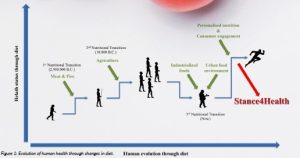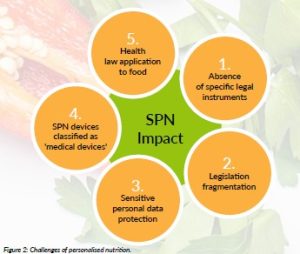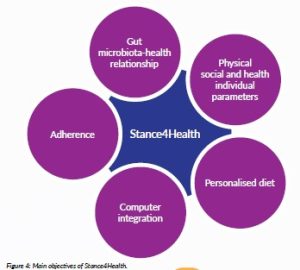Sergio Pérez Burilo, Dpto. Nutrición y Bromatología; Daniel Hinojosa-Nogueira, Instituto de Nutrición y Tecnología de los Alimentos; Silvia Pastoriza de la Cueva, Centro de Investigación Biomédica; and José Ángel Rufián Henares, Universidad de Granada.
Historical context and current situation
Human evolution is connected to continuous changes in diet. Throughout history, there has been a gradual shift towards the consumption of higher quality, energy-dense and easily digestible foods. This change is directly related to the development of new technologies (Katz, 2003).
The first nutritional transition occurred 2.5 million years ago when humans began using fire as a culinary tool, moving from a vegetarian to an omnivorous diet. The second nutritional transition took place 5 000–10 000 years ago when agriculture was developed. This allowed a high production of foods rich in carbohydrates, and there was greater availability throughout the year. The third nutritional transition began in the nineteenth century with industrial development, thanks to electricity and steam (Figure 1). This nutritional transition increased the consumption of refined sugars and fats while decreasing the consumption of fresh foods and dietary fibre. This change occurred, evolutionarily speaking, so quickly that the human genome did not have time to adapt (Konner and Eaton, 2010), also causing a loss of diversity in the gut microbiota inherited over generations (Sonnenburg et al., 2016). This ‘maladaptation’ to the modern diet has been proposed as one of the possible causes of the appearance of modern diseases such as cancer, obesity, cardiovascular diseases, diabetes and others (Rabassa et al., 2015).
Personalised nutrition (smart personalised nutrition, SPN) arises in response to the massive increase in the incidence of obesity and overweight (2 billion people in the world according to the World Health Organization (WHO, 2017). Obesity and overweight greatly influence the development of non-communicable diseases (NCDs) that, according to the WHO, kill about 38 million people a year. The main causes of death in developed countries among these diseases are cardiovascular diseases, cancer, chronic respiratory diseases, diabetes, etc.
The complexity of the current food system increases every day so that not only the consumer but also the food industry have more and more problems when making decisions related to food. In addition, social differences are becoming more evident in regards to the economy as well as culture.
It is essential to integrate the knowledge of society in its entire scope—biological, behavioural and environmental. All these factors will play an important role in the population when making healthy decisions. Therefore, allowing or facilitating consumers to be able to make these decisions is paramount. However, these decisions must not only be focused on one’s health or a healthy diet but also allow the use of food obtained sustainably, both socially and environmentally. SPN uses technology such as the ‘internet of things’, emerging technologies, etc., to create innovation possibilities for improving the diet and health of the population while improving the sustainability of the food production system (Hannelore et al. 2016).
Until now, many industrial models have developed some degree of customisation based on consumer food, medical or ethical preferences. However, all these models are focused on a more or less large market sector, but never individually. That is the goal of personalised nutrition—to offer a specific diet for each consumer.
Personalised nutrition has to consider not only food preferences but also food allergies and intolerances, as well as cultural, religious and social aspects, etc. Additionally, it must be based on the biological data of the person, such as gender, weight, age, level of physical activity, possible nutritional deficiencies or disorders, etc. Thus, personalised nutrition could potentially prevent nutritional deficiencies and serve as a therapeutic measure against NCDs, food allergies, etc.
To meet the needs of the individual, personalised nutrition would have to make use of genetic information (although it is not essential) and of the consumer’s gut microbiota since there is a clear relationship between the composition and functionality of said microbiota and the human health. Personalised health based on genetics became more important after the sequencing of the human genome. This gave rise to personalised medicine, where therapeutic strategies were targeted to patients based on their genetic background. Soon, what is known as ‘personalised nutrition’ appeared, which is based on the management of food and its nutrient intake according to the individual’s genomic capacity to greatly improve related chronic diseases through diet. There is scientific evidence that individuals with certain genetic risk variants could benefit from diets based on their genotype. However, there are no long-term studies that demonstrate the success of these interventions. Furthermore, several studies have shown that lifestyle recommendations based on genetic risk do not significantly increase people’s involvement (Hannelore et al., 2016).
Another aspect to consider is the ethical implications since, for example, the genetic information of each consumer is sensitive. However, other data is also provided that must be protected, such as gender, socioeconomic status or religious beliefs, among others. Therefore, personalised nutrition needs a legal and ethical regulatory framework. This is important because for consumers to feel safe when they resort to personalised nutrition, it is necessary to ensure their protection.
In conclusion, all the information collected about a patient (nutritional, genetic, physical, medical, social, etc.) will allow them to be the owner of their food, giving them unprecedented power over it, which can lead to greater involvement. Personalised nutrition will provide a large amount of information that will allow them to make the right decision according to the situation in which they find themselves. However, it is also possible that we encounter some social resistance to accepting health-related decisions that come from mathematical algorithms developed for the SPN. Therefore, it will be necessary to ensure that the consumer has the psychological, physical and social capacity to get involved and adopt a healthy diet.
Challenges faced by SPN
SPN will have to overcome several challenges to become a reality. Firstly, it is necessary to elucidate the role played by the gut microbiota in the development of chronic diseases or the health status of people. This will make it possible to provide specific foods or nutrients that allow their functionality to shift towards a healthier diet. Secondly, all the knowledge and databases must be integrated into software that allows patient monitoring in a simple way. Third, it will be necessary to capture potential users’ attention and ensure that the programme is adhered to. Lastly, given the novelty of the system, guidelines must be established for the protection of consumer data as well as establishing ethical principles together with its own legislation for the SPN (Figure 2).
Stance4Health contribution to personalised nutrition
With the aim of promoting SPN and thus tackling some of the main health problems of the twenty-first century, the project ‘Smart Technologies for personAlized Nutrition and Consumer Engagement’ (Stance4Health) was created, financed with European funds from the Horizon 2020 programme (grant number 816303) and with a duration of 48 months. It is an international project of a multidisciplinary nature to address all areas related to the SPN (Hinojosa-Nogueira et al., 2020). A total of 19 partners participate in Stance4Health: University of Granada, Foundation for the Promotion of Health and Biomedical Research of the Valencian Community, University of Navarra, Health and Nutrition Management S.L., SANAVÍ S.L., RM FARMAMEDICAL S.L. (Spain), Technical University of Berlin, University of Hamburg, Biozoon GMBH and CENTIV (Germany), TriTECC SRL (Romania), Institute of Food Sciences and Fine Chemistry Research Center SRL (Italy), University of Athens, University of Patras and University of Ioaina (Greece), European Center for Food Information (Belgium), University of Bath (United Kingdom) and University of Aarhus (Denmark). All these partners are working closely in nine work packages (WPs) that include the gut microbiota-diet relationship, development of specific food composition databases, consumer studies, development of tailored food supplements and a metabolomics test to study gut microbiota metabolism (Rufián Henares, 2021), testing of the complete SPN service in adult and children populations, communication, dissemination and exploitation of results, among others (Figure 3).
Stance4Health aims to establish a personalised nutrition system that can meet the nutritional needs of both healthy consumers and those with a pathology through diet generation and nutritional composition software. In addition, the nutritional and health status will be monitored through a smartwatch that will indicate how the diet should be modified according to the personal situation of each consumer. Thus, the personalised nutrition programme proposed by Stance4Health is able to develop a diet and suggest foods that modify the composition and functionality of the gut microbiota in a way that promotes the production of healthy metabolites. In this way, the final objective is to achieve, through an individualised nutrition programme, patient adherence to a healthy diet in the long term (Figure 4).
References
Hannelore, D., Byrne, P. and Raats, M. (2016) Smart personalized nutrition: Quo Vadis. Reflection paper on the discussions of the Smart Personalized Nutrition workshop, 16 June, Brussels.
Hinojosa-Nogueira, D., Pérez-Burillo, S., Pastoriza, S. and Rufián-Henares, J.A. (2020) ‘Smart Technologies for personAlised Nutrition and Consumer Engagement’, The Project Repository Journal, 7, pp. 80–83. Available at: https://edition.pagesuite-professional.co.uk/html5/reader/production/default.aspx?pnum=80&edid=c2e20a7f-4d97-4ec6-b15e-ea040b9b71d7.
Katz, S.H. (2003) Encyclopedia of Food and Culture. Scribner.
Konner, M. and Eaton, S.B. (2010) ‘Paleolithic nutrition: twenty-five years later’, Nutrition in Clinical Practice, 25(6), pp. 594–602. doi: 10.1177/0884533610385702.
Rabassa, M., Zamora-Ros, R., Urpi-Sarda, M., Bandinelli, S., Ferrucci, L., Andres-Lacueva, C. and Cherubini, A. (2015) ‘Association of habitual dietary resveratrol exposure with the development of frailty in older age: the Invecchiare in Chianti study’, The American Journal of Clinical Nutrition, 102(6), pp. 1534–1542. doi: 10.3945/ajcn.115.118976.
Rufián-Henares, J.A. (2021) ‘MetaCliniq: a metabolomics tool for the development of a personalised nutrition service within the Stance4Health project’, The Project Repository Journal, 10, pp. 42–45. doi: 10.54050/PRJ10042045.
Sonnenburg, E.D., Smits, S.A., Tikhonov, M., Higginbottom, S.K., Wingreen, N.S. and Sonnenburg J.L. (2016) ‘Diet-induced extinctions in the gut microbiota compound over generations’, Nature, 529(5758), pp. 212–215. doi: 10.1038/nature16504.
WHO (2017) Obesity and Overweight. Available at: https://www.who.int/news-room/fact-sheets/detail/obesity-and-overweight. (Accessed 10 June 2022)
PROJECT SUMMARY
The overall objective of Stance4Health is to develop a complete smart personalised nutrition service based on the use of mobile technologies as well as tailored food production that will optimise gut microbiota activity and long-term consumer engagement. The project will focus on both the adult population (lean and overweight people) and children (lean, obese coeliac disease or food allergy).
PROJECT PARTNERS
The Stance4Health consortium consists of 19 partners from eight European countries (Spain, Germany, Denmark, Romania, Italy, Greece, Belgium and the UK). Six SMEs will be in charge of the development and future commercialisation of a new app for personalised nutrition, tailored cereal-derived foods, one nutraceutical and one in vitro diagnostic test to control the gut microbiota activity.
PROJECT LEAD PROFILE
Stance4Health is led by Prof. José Ángel Rufián-Henares, Professor of Nutrition and Food Sciences at the University of Granada (Spain). Prof. Rufián-Henares has a strong background in food processing, food composition analysis and the effect of food on gut microbiota composition and functionality.
CONTACTS
José Ángel Rufián Henares
Address: Departamento de Nutrición y Bromatología, Facultad de Farmacia, Campus de Cartuja S/N, 10871, Granada, España.
Telephone: +34 958 24 28 41
Email: jarufian@ugr.es
Twitter: @Stance4Health
Facebook: Stance4Health
Linkedin: linkedin.com/company/stance4health
FUNDING
This work was supported by the European Research Commission (Research Executive Agency) under the research project Stance4Health under grant agreement No. 816303.
Figure legends
Figure 1: Evolution of human health through changes in diet.
Figure 2: Challenges of personalised nutrition.
Figure 3: Work packages of Stance4Health.





